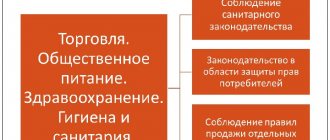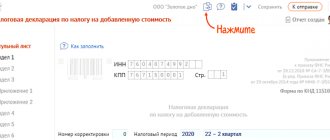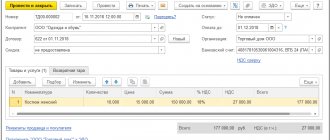E. M. Taranenko author of the article, legal consultant to Askon
Rospotrebnadzor can conduct scheduled inspections only of those organizations and individual entrepreneurs whose activities and production facilities are classified as extremely high or high risk. In the field of consumer rights protection, routine inspections by Rospotrebnadzor are not carried out at all. With unscheduled events the situation is the opposite. Coronavirus requirements have become more stringent. Rospotrebnadzor imposes serious fines and may even close the company. In this article we will look at how unscheduled inspections are carried out, what inspectors have the right to do, and what they now pay special attention to.
What legal acts are the inspectors guided by?
— Federal Law No. 294-FZ of December 26, 2008 “On the protection of the rights of legal entities and individual entrepreneurs in the exercise of state control (supervision) and municipal control” (hereinafter referred to as Federal Law No. 294);
— Order of Rospotrebnadzor dated July 16, 2012 No. 764 “On approval of the Administrative Regulations for the execution by the Federal Service for Supervision of the Protection of Consumer Rights and Human Welfare of the state function of conducting inspections of the activities of legal entities, individual entrepreneurs and citizens to comply with the requirements of sanitary legislation, legislation of the Russian Federation in the field of consumer rights protection, rules for the sale of certain types of goods" (hereinafter referred to as the Administrative Regulations);
— Order of Rospotrebnadzor dated March 24, 2010 No. 103 “On approval of Methodological recommendations for the application of the norms of Federal Law dated December 26, 2008 No. 294-FZ”
What exactly are the lawyers of KG ETALON ready to do for you:
- Analyze organizational and administrative documents (directives/orders) regulating the company’s activities during the period of “high alert mode”;
- Draw up organizational and administrative documents (directives/orders) regulating the company’s activities during the period of “high alert mode”:
- Order on the introduction of a high alert regime in connection with the threat of the spread of coronavirus infection;
- Order on organizing work in an unfavorable epidemiological situation;
- Instructions/orders for the prevention of new coronavirus infection;
- Documents confirming the disinfection of premises with the required regularity (schedule, log - form);
- Order to measure employees' temperature;
- Temperature measurement log (form);
- Instructions on the procedure for incoming inspection;
- Order appointing someone responsible for preventive measures, etc.
When conducting an inspection, Rospotrebnadzor does not have the right to:
Article 15 of Federal Law No. 294, clause 57 of the Administrative Regulations
1) verify compliance with mandatory requirements, if such requirements do not relate to the sanitary and epidemiological well-being of the population or the protection of consumer rights;
2) carry out a scheduled or unscheduled on-site inspection in the absence of the manager or his authorized representative or the person being inspected during the inspection (except for the case of such an inspection, the basis for which is harm to the life, health of citizens, the environment, as well as the occurrence of emergency situations of natural and man-made nature);
3) demand the submission of documents, information, product samples, inspection samples of environmental objects and industrial environment objects that are not objects of inspection or are not related to the subject of inspection, and also seize the originals of such documents;
4) take samples of products, samples of inspection of environmental objects and industrial environment objects to conduct their research without drawing up protocols and in quantities exceeding the norms established by the standards;
5) disseminate commercial information obtained as a result of the event;
6) exceed the established deadlines for conducting the inspection.
7) demand from a legal entity, individual entrepreneur the submission of documents and (or) information, including permits available to other government bodies,
 require a legal entity or individual entrepreneur to submit documents and information before the start date of the inspection.
require a legal entity or individual entrepreneur to submit documents and information before the start date of the inspection.
On-site inspection by Rospotrebnadzor
Article 12 of Federal Law No. 294, paragraphs 48-51 of the Administrative Regulations
An on-site inspection is carried out at the place of activity of the person being inspected. Rospotrebnadzor employees are obliged to:
- present your official ID,
— familiarize the person being inspected with the order (order) to conduct an on-site inspection
— familiarize the inspected person with the powers of those conducting the inspection, the goals, objectives, grounds for conducting the on-site inspection, the types and scope of control measures, the composition of experts, representatives of expert organizations involved in the on-site inspection, the terms and conditions of its conduct.
On-site inspections are carried out only in the presence of an individual entrepreneur or the head of a legal entity, or their representatives. If they are absent, an on-site inspection will not be carried out.
If it turns out to be impossible to conduct an on-site inspection, a Rospotrebnadzor employee draws up a report on the impossibility of conducting the appropriate inspection. In this case, Rospotrebnadzor may conduct an inspection without warning within 3 months from the date of drawing up the relevant act. If samples (samples) of products are taken, drawing up a protocol is mandatory.
Common Disorders
Let's look at the most common violations that Rospotrebnadzor detects in beauty salons, medical centers, pharmacies, cafes and shops.
Violations of beauty salons and hairdressing salons:
- There is no required triple tool kit;
- There are no ultraviolet lamps and no accounting of their operation;
- Violation of the rules for processing tools;
- There are no markings on disinfectants and other products;
- There are no separate areas for manicure and pedicure;
- No foot bath;
- There is no special area designated for garbage or dirty laundry;
- Unsatisfactory sanitary condition of the premises;
- Employees did not undergo medical examination;
- There is no sign at the entrance.
Pharmacy violations:
- Non-compliance with SanPin requirements for temperature and humidity levels in the room;
- Violation of conditions and shelf life of medicines;
- Failure to comply with the washing regime for workwear;
- Employees did not undergo medical examination;
- Clients do not have access to information about medications (composition, price, contraindications).
Violations in public catering:
- There is no necessary ventilation of the room;
- Finished products are stored next to semi-finished products, and dirty dishes are stored next to clean ones;
- Acceptance and sale of products without accompanying documents confirming their quality and safety;
- Failure to comply with expiration dates and food processing rules;
- Employees are allowed to work without a medical examination;
- There are no markings on cutting tools;
- There is no hygienic (convenient for sanitation) coating on the working surfaces;
- There are no staff or tools for complete cleaning.
Violations of retail outlets:
- Failure to comply with sanitary and technical requirements for premises;
- Temperature and humidity in warehouses are not measured;
- Storing products in places not intended for this purpose;
- The products do not have markings that comply with the standards;
- There are no examination protocols, the frequency and scope of examinations are not observed;
- There is no complete information on the price tags.
Documentary check of Rospotrebnadzor
Article 11 of Federal Law No. 294, paragraph 45-47 of the Administrative Regulations
It is carried out on the basis of an order (instruction) to conduct a documentary check. Rospotrebnadzor officials authorized to conduct an inspection do not have the right to demand from persons subject to inspection information and documents that are not related to the subject of the documentary inspection. Rospotrebnadzor employees cannot require notarization of copies of documents, unless otherwise provided by law.
If you receive a request for additional documents or explanations, you must provide them to Rospotrebnadzor within 10 working days. All copies of documents must be certified by the signature of the general director and seal.
If violations are detected based on the results of a documentary inspection, Rospotrebnadzor has the right to conduct an on-site inspection.
Prices
| You can find out the exact cost by calling: 8(495)181-42-48 |
You might also be interested in
Documents for opening a laundry
To avoid all the pitfalls and draw up a package of documents for the SES laundry as needed, contact the SES-DOK company.
Documents for hotel and hotel
If you do not have enough time to understand the topic of sanitary documentation for a hotel or inn, contact the SES-DOC service. The case will be taken over by specialists: sanitary doctors and lawyers with nine years of experience working with sanitary documents.
License for kindergarten
If you are starting or conducting educational activities (for example, you are going to open a private kindergarten), you are under the control of various supervisory authorities, in particular, the SES. Obtaining a permit and license, passing inspections - all this requires a large set of documents.
Unscheduled inspection of Rospotrebnadzor
Article 10 of Federal Law No. 294, paragraphs 42-43 of the Administrative Regulations
The reasons are:
- failure to comply with the order of Rospotrebnadzor to eliminate the identified violation;
- Rospotrebnadzor receives requests and statements, information about the following facts:
- causing or threatening to cause harm to the life or health of citizens
— the occurrence or threat of emergencies of a natural or man-made nature;
— violation of consumer rights (in the case of applications from citizens whose rights have been violated), provided that the applicant applied to such a legal entity or individual entrepreneur, but the applicant’s demands were not satisfied;
- order (instruction) of the head of Rospotrebnadzor, issued in accordance with the instructions of the President of the Russian Federation, the Government of the Russian Federation;
- the prosecutor's request to conduct an unscheduled inspection.
Rospotrebnadzor is obliged to notify you 24 hours before conducting an unscheduled inspection. However, if the basis for the inspection is that Rospotrebnadzor receives reports of harm to life and health, or such a threat, as well as the occurrence or threat of emergencies of a natural and man-made nature or a violation of consumer rights, Rospotrebnadzor may not notify you.
Documents to be verified
Many entrepreneurs are interested in the question, what documents does Rospotrebnadzor check? By law, an entrepreneur is required to provide for verification:
- Statute, charter;
- Completed health certificates;
- Documentation of control of sanitary standards;
- Licenses to provide services;
- Notice boards;
- Books of complaints and statements;
- Menu or price list;
- Documents on the basis of which the premises were rented or purchased;
- Contracts with third parties (for waste removal, disinfection);
- Sanitary audit logs;
- Logbook for registration of disinfectants.
Scheduled inspection of Rospotrebnadzor
Article 9 of Federal Law No. 294, paragraph 41 of the Administrative Regulations
The basis is the annual inspection plan. The list of persons being checked is published on the website of the prosecutor's office. For example, the plan for inspections of legal entities in Moscow is available here.
Rospotrebnadzor is obliged to notify the persons being inspected at least 3 working days in advance by sending a copy of the order (order) about the start of a scheduled inspection. A scheduled inspection can be carried out no more often than once every three years, with the exception of inspections of organizations involved in the healthcare, education, and social spheres. A complete list of activities of such organizations is established in Decree of the Government of the Russian Federation dated November 23, 2009 No. 944.
In the event of a scheduled inspection of members of a self-regulatory organization, Rospotrebnadzor is obliged to notify the self-regulatory organization
Who can be checked
The wider the scope of control of the inspection body, the more organizations risk falling under its inspection. In this regard, Rospotrebnadzor is among the leaders. Almost any enterprise can be inspected, but most often companies that work closely with the public, that is, with consumers, in the service sector, trade, and education are inspected.
Simply put, Rospotrebnadzor controls any activity that involves consumer relations.
Rospotrebnadzor inspection deadlines
Article 13 of Federal Law No. 294, clauses 18-22 of the Administrative Regulations
As a general rule, the verification period cannot exceed 20 working days. If an organization has several branches in different constituent entities of the Russian Federation, then the period for checking all branches in total cannot exceed 60 working days. When organizing an inspection, the work schedule of the persons subject to inspection is taken into account.
The duration of a scheduled on-site inspection of small enterprises is no more than 50 hours, and of microenterprises no more than 15 hours.
The period for conducting a scheduled on-site inspection may be extended in exceptional cases by no more than 20 working days, for small enterprises - no more than 50 hours, for micro-enterprises - no more than 15 hours.
Preparation for the audit
The best way to pass the test with honor is to turn to specialists. There are a number of commercial organizations offering consultations and documentation preparation.
It is unlikely that you will be able to quickly put the documentation in order yourself. Therefore, if you do not want to spend money on additional services, you should organize the enterprise so that the inspector does not find anything even during a surprise inspection.
Pay attention to employee health records, quality certificates, shelf life of products, frequency of disinfection, and reliability of prices.
Results of the Rospotrebnadzor inspection
clause 58-76 of the Administrative Regulations
Based on the results of the inspection, Rospotrebnadzor draws up an inspection report and delivers (sends) the report to the person being inspected.
The following is attached to the act:
- product sampling protocols;
- protocols or conclusions of studies, tests, measurements, examinations;
- explanations of the person being inspected or his employees who are held responsible for violation of mandatory requirements;
- an order to eliminate identified violations;
- other documents or copies thereof related to the inspection results.
Penalties
After checking the store by Rospotrebnadzor, the entrepreneur may be involved in:
- Administrative;
- Disciplinary;
- Civil;
- Criminal.
The most common penalty for deficiencies identified during an inspection is administrative liability in the form of a fine. The amount of penalties ranges from twenty to two hundred thousand rubles. For failure to comply with the instructions of Rospotrebnadzor, the enterprise is held accountable under the administrative code. You can appeal such a decision within ten days.
For what offenses can Rospotrebnadzor hold you accountable?
Concealing the source of infection with HIV infection, venereal disease and contacts that create a risk of infection (Article 6.1 of the Code of Administrative Offenses of the Russian Federation);
- Circulation of counterfeit, counterfeit, substandard and unregistered medicines, medical products and circulation of counterfeit dietary supplements (Article 6.33 of the Code of Administrative Offenses of the Russian Federation);
- Violation of the rules for handling scrap and waste of non-ferrous and ferrous metals and their alienation (Article 14.26 of the Code of Administrative Offenses of the Russian Federation);
- Violation of the rules for organizing activities for the sale of goods in retail markets (Part 1 of Article 14.34 of the Code of Administrative Offenses of the Russian Federation)
- Violation by the manufacturer, performer (a person performing the functions of a foreign manufacturer), seller of the requirements of technical regulations (Part 3 of Article 14.43 of the Code of Administrative Offenses of the Russian Federation)
- Violation of mandatory requirements for labeling food products obtained using genetically modified organisms or containing such organisms (Article 14.46.1 of the Administrative Code of the Russian Federation);
- Failure of the manufacturer (executor, seller, person performing the functions of a foreign manufacturer) to take measures to prevent harm when handling products that do not comply with the requirements of technical regulations (Part 5 of Article 14.46.2 of the Code of Administrative Offenses of the Russian Federation)
- Disobedience to a lawful order of an official of a body exercising state supervision (control), an official of an organization authorized in accordance with federal laws to exercise state supervision, an official of a body exercising municipal control (Part 1 of Article 19.4 of the Code of Administrative Offenses of the Russian Federation)
- Obstruction of the legitimate activities of an official of a federal executive body exercising control and supervision functions in the field of state defense procurement, or officials of its territorial bodies (Part 1 and 15 of Article 19.4.2 of the Code of Administrative Offenses of the Russian Federation)
- Failure to take measures to eliminate the causes and conditions that contributed to the commission of an administrative offense (Article 19.6 of the Code of Administrative Offenses of the Russian Federation)
- Failure to provide information (Article 19.7 of the Code of Administrative Offenses of the Russian Federation)
- Failure to comply with the requirements for the submission of product samples, documents or information necessary for the implementation of state control (supervision) in the field of technical regulation (Article 19.33 of the Code of Administrative Offenses of the Russian Federation)
If the inspection reveals signs of crime, the Rospotrebnadzor official sends materials to the prosecutor's office and other law enforcement agencies to resolve the issue of initiating a criminal case. These may be the following articles of the Criminal Code:
- Art. 238 “Production, storage, transportation or sale of goods and products, performance of work or provision of services that do not meet safety requirements” - regarding the sale of goods and products, performance of work or provision of services that do not meet the requirements for the safety of life or health of consumers;
- Art. 246 “Violation of environmental protection rules during the performance of work” - regarding violation of sanitary rules during construction and other work;
- Art. 247 “Violation of the rules for handling environmentally hazardous substances and waste” - regarding violation of the rules for handling bacteriological (biological) substances, toxic industrial and other waste;
- Art. 248 “Violation of safety rules when handling microbiological or other biological agents or toxins” - in terms of violation of safety rules for working with microorganisms, etc.;
- Art. 254 “Damage of land” - in terms of violation of the rules for handling fertilizers, plant growth stimulants, pesticides and other dangerous chemical or biological substances, etc.
What documents are checked?
During the inspection, Rospotrebnadzor inspectors pay attention to the presence and correct execution of the following documents:
- Constituent documents (TIN, Charter);
- Employee health records (if required);
- Production control program (how temperature and lighting in the premises are controlled, how often clothes are washed and cleaned);
- Licenses to carry out activities;
- Signs;
- Consumer corners;
- Price lists, catalogs, menus;
- Documents for the right to own or lease premises;
- Agreements with third-party organizations providing waste removal and disposal services, disinfection, etc.;
- Logs of sanitary and epidemiological inspections;
- Logbook for disinfection products (this must be registered in advance).
Appealing the results of the Rospotrebnadzor inspection
1. Objection to the inspection report
Within 15 days from the date of receipt of the inspection report, an organization or individual entrepreneur has the right to submit objections in writing (clause 82 of the Administrative Regulations).
2. Challenging the order of Rospotrebnadzor
Pre-trial order. Within 15 days from the date of receipt of the order, the inspected person has the right to submit written objections regarding this order to Rospotrebnadzor. The review period is 30 days.
Judicial order. Within 3 months, the decision can be appealed to the Arbitration Court (Clause 5.1, Article 40 of the Federal Law “On Protection of Consumer Rights”).
3. Appealing the decision to bring to administrative responsibility Pre-trial procedure. If you have been brought to administrative responsibility, you have the right to appeal this decision (Part 1 of Article 30.1 of the Code of Administrative Offenses of the Russian Federation) to a higher authority. The deadline for filing such a complaint is 10 days on the day of delivery or receipt of a copy of the resolution (Part 1 of Article 30.3 of the Code of Administrative Offenses of the Russian Federation). If the deadline for filing a complaint is missed, it can be restored by a judge or official authorized to consider the complaint at the request of the person filing the complaint. The period for consideration of a complaint against a decision in the order of subordination is 10 days from the date of its receipt with all materials of the case (Part 1 of Article 30.5 of the Code of Administrative Offenses of the Russian Federation). Judicial order. The decision can also be appealed to the Arbitration Court. The period for consideration of a complaint in court is 2 months from the date of its receipt (Part 1.1 of Article 30.5 of the Code of Administrative Offenses of the Russian Federation).
4. Appealing actions (inactions) of Rospotrebnadzor
The subject of pre-trial appeal is the actions (inaction) of Rospotrebnadzor, officials of Rospotrebnadzor, which entailed a violation of the rights of legal entities, individual entrepreneurs, citizens provided for by law (clause 83 of the Administrative Regulations).
Pre-trial order. Complaints are considered:
1) on behalf of Rospotrebnadzor - the head of Rospotrebnadzor or his deputy;
2) on behalf of the territorial body of Rospotrebnadzor - the head of the territorial body of Rospotrebnadzor or his deputy.
The review period is 30 days.
Judicial order. Within 3 months, an entrepreneur or organization has the right to challenge the actions (inactions) of Rospotrebnadzor in the Arbitration Court.
If you receive an order to eliminate identified violations:
- you have 15 days from the date of receipt of the inspection report to submit to Rospotrebnadzor in writing your objections to the issued order in general or its individual provisions. You can also attach documents that will confirm the validity of the objections.
- When the deadline for fulfilling the issued order expires, the Rospotrebnadzor official will organize an unscheduled inspection. The inspection is carried out no later than 1 month from the end of the period during which the person who received the order should have notified the Rospotrebnadzor official who issued the order about its implementation.
- If during an unscheduled inspection it turns out that you did not comply with the order within the appointed time, an official of Rospotrebnadzor initiates proceedings for an administrative offense and issues a new order to eliminate violations (which you did not eliminate within the appointed time) with new deadlines for their elimination.
How can you challenge the results of an inspection on formal grounds?
The results of an inspection conducted by a state control (supervision) body or a municipal control body with a gross violation of the requirements for organizing and conducting inspections cannot be evidence of violations by a legal entity or individual entrepreneur and are subject to cancellation.
Thus, a gross violation is (Article 20 of Federal Law No. 294):
- lack of grounds for conducting a scheduled or unscheduled on-site inspection, untimely notification of an inspection;
- involving legal entities, individual entrepreneurs and citizens not certified in the established procedure as experts in carrying out control activities;
- lack of coordination, if necessary, with the prosecutor's office of an unscheduled on-site inspection;
- violation of the terms and time of scheduled on-site inspections in relation to small businesses;
- carrying out an inspection without a directive or order from the head, deputy head of the state control (supervision) body, or municipal control body;
- requesting documents not related to the subject of the inspection;
- failure to submit an inspection report;
- carrying out a scheduled inspection not included in the annual plan for scheduled inspections;
- participation in inspections of experts, expert organizations that have civil and labor relations with legal entities and individual entrepreneurs in respect of whom inspections are carried out.
What needs to be done to prevent the negative consequences of the check:
- Study regulatory documents:
- Letter of Rospotrebnadzor dated March 10, 2021 N 02/3853-2020-27 on measures to prevent the new coronavirus infection (COVID-19);
- Rospotrebnadzor dated 04/23/2020 Information “On recommendations on how to choose an antiseptic against coronavirus
- Letter of Rospotrebnadzor dated April 21, 2020 No. 02/7495-2020-32 On carrying out preventive and disinfection measures in trade organizations
- Letter of Rospotrebnadzor dated January 23, 2020 No. 02/770-2020-32
- SanPiN 2.4.4.2599-10
- Recommendations of Rospotrebnadzor dated April 18, 2020 No. 02/7329-2020-27.
- Draw up organizational and administrative documents confirming that the company has taken all necessary measures aimed at compliance with sanitary rules, sanitary and hygienic standards and anti-epidemic measures:
- Order on the introduction of a high alert regime in connection with the threat of the spread of coronavirus infection;
- Order on organizing work in an unfavorable epidemiological situation;
- Instructions/Order for the prevention of new coronavirus infection;
- Documents confirming the disinfection of premises with the required regularity (schedule, log);
- Order to measure employees' temperature;
- Temperature measurement log;
- Instructions on the procedure for incoming inspection;
- Order appointing someone responsible for preventive measures, etc.
In order to protect your interests as much as possible during the period of the “high alert regime” and avoid financial losses, it is better to seek help from the lawyers of KG ETALON.






